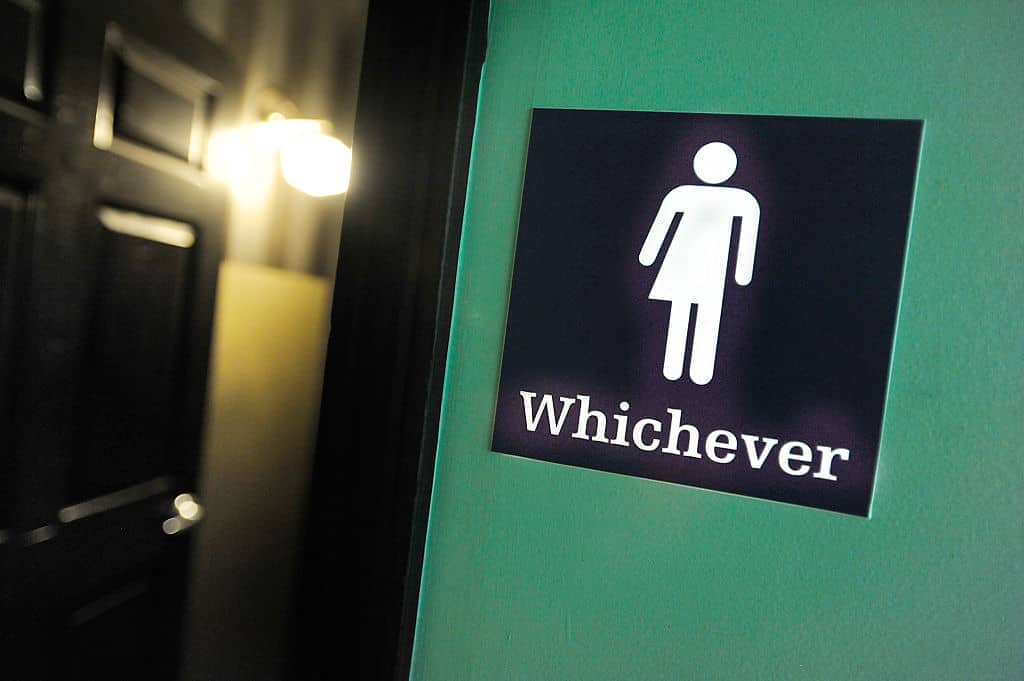Which toilet should a trans pupil be allowed to use? Teachers like me have enough on our plates with the day job, but we must also face questions like this. Whatever our answer, we are bound to annoy someone. Yet for too long, ministers have shied away from offering a helping hand in this toxic debate. Unfortunately, it looks as though Liz Truss’s government is going to continue that unhelpful approach.
Schools are in desperate need of clear guidance for helping include transgender pupils without compromising the rights of others. Activist groups have held sway for too long, and – as a teacher – it was a relief to hear the Department for Education had called on both the Equality and Human Rights Commission and doctors to produce an ‘evidence-based guide’. But listening to some of the language emanating from the Government, another failure of leadership appears to be on the cards.
Kit Malthouse, the latest in a long line of education secretaries, is said to be looking for a ‘common-sense approach’. Meanwhile, a senior government source told the Times ‘we need to get back to that British fudge that so often works’. Oh dear.
‘Evidence-based guidance’ in the trans debate cannot come soon enough
Maybe this uneasy compromise – which could include making toilets gender neutral – sort-of worked for a vanishingly small number of transsexual adults. But today’s ‘transgender umbrella’ covers a rather larger and more diverse demographic. It includes, for example, those adults who might formerly have been described as transvestites, or cross-dressers or even drag queens. At the same time, it has incorporated a cohort of children struggling with adolescence who may grow up to realise they are not transgender after all.
The safeguarding of children cannot rely on a fudged policy. Any awkward compromise also struggles with a basic conundrum at the heart of the trans debate: that there are two incompatible views. Boys and girls are distinguished by their so-called gender identity, or their biological sex. We cannot accept both. So talk of an uneasy middle ground is doomed to failure from the outset.
One minister has apparently said ‘we don’t want this to be a culture war’. No, we don’t. But only by implementing clear policies and rules in this fiery debate can the government ensure this doesn’t descend into trouble.
Miriam Cates, a Tory MP and former science teacher, was at least clear when she spoke to The Spectator: ‘This is a child safeguarding issue and we should never be using the language of compromise when it comes to safeguarding.’
Cates is right, we cannot compromise on rights. The DfE must ignore calls to fudge the issue. There are two protected characteristics; both must be upheld. Firstly, children covered by what the Equality Act calls ‘Gender Reassignment’ must not be treated less favourably than any other children. That is hardly contentious. Nor should it be controversial to keep those children safe from harassment and intimidation, just like schools protect other children.
Meanwhile, despite attempts by activist groups to replace sex with gender, or gender identity, boys and girls are protected from discrimination according to their biological sex. It’s vital to remember this: any policy that does not respect and uphold the protected characteristic of sex is not fit for purpose.
Crucially, single sex spaces are also protected in law. The Equality Act says they are a ‘proportionate means of achieving a legitimate aim’. The School Premises (England) Regulations (2012) are also clear: ‘Separate toilet facilities for boys and girls aged eight years or over must be provided.’ Sport is another area where the need to segregate by sex should be self-evident.
Maybe this existing approach is what ministers had in mind with their talk of ‘common sense’ and compromise? Schools should maintain sex segregation where sex matters, and promote ‘inclusion’ where it doesn’t. Job done, n’est-ce pas? No, there will no peace in our schools if the DfE leaves it there. Lamentably there is a culture war, and it cuts to the heart of human society. What does it mean to be a man or a woman, or a boy or a girl, and who gets to choose which third-person-singular pronouns to use – the person being described, or the person doing the describing? We cannot do both.
That is the heart of the issue; unfortunately there is no hope of compromise. Whatever guidance the DfE eventually produces, it will no doubt upset someone, maybe even everyone. But schools do not need guidance that tries to please, we need it to restore confidence – and help teachers focus on teaching. If the DfE hopes to diffuse the culture war, it must do what is right.
Inconvenient truths are still truths, and biological sex is still real. Let’s hear no more of fudge; schools must be advised to ground their policies in science and in facts. ‘Evidence-based guidance’ in the trans debate cannot come soon enough.







Comments